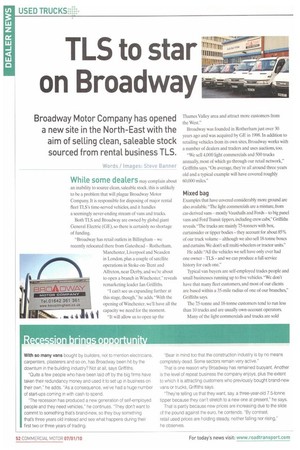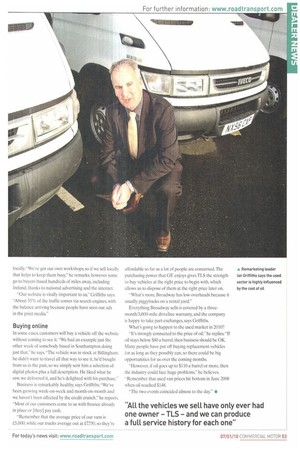TLS to star on Broadway
Page 52

Page 53

If you've noticed an error in this article please click here to report it so we can fix it.
Broadway Motor Company has opened a new site in the North-East with the aim of selling clean, saleable stock sourced from rental business TLS.
Words / Images: Steve Banner While some dealers may complain about an inability to source clean, saleable stock, this is unlikely to be a problem that will plague Broadway Motor Company. It is responsible for disposing of major rental fleet TLS's time-served vehicles, and it handles a seemingly never-ending stream of vans and trucks.
Both TLS and Broadway are owned by global giant General Electric (GE), so there is certainly no shortage of funding.
"Broadway has retail outlets in Billingham — we recently relocated there from Gateshead — Rotherham. Manchester, Liverpool and Neasden in London, plus a couple of satellite operations in Stoke-on-Trent and Alfreton, near Derby, and we're about to open a branch in Winchester," reveals remarketing leader Ian Griffiths.
can't see us expanding further at this stage, though," he adds, "With the opening of Winchester. we'll have all the capacity we need for the moment.
"It will allow us to open up the Thames Valley area and attract more customers from the West."
Broadway was founded in Rotherham just over 30 years ago and was acquired by GE in 1998. In addition to retailing vehicles from its own sites, Broadway works with a number of dealers and traders and uses auctions, too.
"We sell 4,000 light commercials and 500 trucks annually, most of which go through our retail network," Griffiths says. "On average, they're all around three years old and a typical example will have covered roughly 60,000 miles."
Mixed bag
Examples that have covered considerably more ground are also available. "The light commercials are a mixture, from car-derived vans — mostly Vauxhalls and Fords — to big panel vans and Ford Transit tippers, including crew cabs," Griffiths reveals. "The trucks are mainly 7.5-tormers with box, curtainsider or tipper bodies — they account for about 85% of our truck volume — although we also sell 18-tonne boxes and curtains.We don't sell multi-wheelers or tractor units."
He adds: "All the vehicles we sell have only ever had one owner —TLS — and we can produce a full service history for each one."
Typical van buyers are self-employed trades people and small businesses running up to five vehicles. "We don't have that many fleet customers, and most of our clients are based within a 35-mile radius of one of our branches," Griffiths says.
The 7.5-tonne and 18-tonne customers tend to run less than 10 trucks and are usually own-account operators. Many of the light commercials and trucks are sold locally. "We've got our own workshops, so if we sell locally that helps to keep them busy," he remarks, however some go to buyers based hundreds of miles away, including Ireland, thanks to national advertising and the internet.
"Our website is vitally important to us," Griffiths says. "About 35% of the traffic comes via search engines, with the balance arriving because people have seen our ads in the print media."
Buying online
In some cases, customers will buy a vehicle off the website without coming to see it. "We had an example just the other week of somebody based in Southampton doing just that," he says. "The vehicle was in stock at Billingham, he didn't want to travel all that way to see it, he'd bought from us in the past, so we simply sent him a selection of digital photos plus a full description. He liked what he saw, we delivered it, and he's delighted with his purchase."
Business is remarkably healthy, says Griffiths. "We've been growing week-on-week and month-on-month and we haven't been affected by the credit crunch,he reports "Most of our customers come to us with finance already in place or [they] pay cash.
"Remember that the average price of our vans is £5,000, while our trucks average out at £7,750, so they're affordable so far as a lot of people are concerned. The purchasing power that GE enjoys gives TLS the strength to buy vehicles at the right price to begin with, which allows us to dispose of them at the right price later on.
"What's more, Broadway has low overheads because it usually piggybacks on a rental yard."
Everything Broadway sells is covered by a threemonth/3,000-mile driveline warranty, and the company is happy to take part-exchanges, says Griffiths.
What's going to happen to the used market in 2010?
-It's strongly connected to the price of oil," he replies."If oil stays below $80 a barrel, then business should be OK. Many people have put off buying replacement vehicles for as long as they possibly can, so there could be big opportunities for us over the coming months.
"However, if oil goes up to $110 a barrel or more, then the industry could face huge problems," he believes. -Remember that used van prices hit bottom in June 2008 when oil reached $148.
"The two events coincided almost to the day." •




























































































































